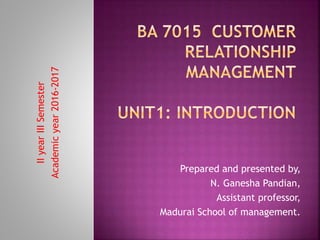
Customer relationship management unit 1 introduction
- 1. Prepared and presented by, N. Ganesha Pandian, Assistant professor, Madurai School of management. IIyearIIISemester Academicyear2016-2017
- 2. Definitions Concepts and context of relationship management Evolution Transactional Vs relationship approach CRM as a strategic marketing tool CRM significance to the stakeholders
- 3. Customer relationship management can be defined as a business philosophy and set of strategies, programs, and systems that focuses on identifying and building loyalty with a marketer’s profitable customers. The goal is to develop a base of loyal customers who patronize the retailer frequently
- 4. According to Gartner, “CRM is a business strategy designed to optimize profitability, revenue and customer satisfaction”. According to PWC consulting, “CRM is a business strategy that aims to understand/appreciate, manage and personalize the needs of an organization’s current and potential customers”.
- 5. CRM consists of three definitional components in its architectural structure: 1. Customer 2. Relationship 3. Management
- 6. Relationship management is a strategy employed by an organization in which a continuous level of engagement is maintained between the organization and its audience. Relationship management aims to create a partnership between the organization and its audience rather than consider relationship merely transactional.
- 7. Concepts and context of Relationship management Quality Commitment Promise Trust Shared goals and mutual benefits Satisfaction
- 8. The concept of customer relationship management came into vogue in the mid 1990’s, CRM has undergone a substantial evolution. 1. First generation (Functional CRM approach) - Sales force automation (SFA) -Customer service and support (CSS) 2. Second generation (customer facing front end approach) 3. Third generation (strategic approach)
- 9. 1. Strategic CRM: is a core customer centric business strategy aims at winning and keeping profitable customers 2. Operational CRM: focuses on the automation of customer facing processes such as selling, marketing and customer service
- 10. 3. Analytical CRM: focuses on the intelligent mining of customer related data for strategical or tactical purposes 4. Collaborative CRM: applies technology across organizational boundaries with a view to optimizing company, partner and customer value
- 11. Product oriented Production oriented Sales oriented A customer / Market oriented
- 12. 1. Marketing automation Market segmentation Campaign management Event based marketing 2. Sale force automation Account Management Lead management Opportunity management Pipeline management Contract management Quotation and proposal management Product configuration
- 13. 3. Service Automation Case management Inbound communications management Queuing and routing Service level management
- 14. Transactional marketing or mass marketing is on individual transaction and does not concern continuous relationship with customers Relationship marketing focus on continuous multiple transactions rather than isolated individual transactions.
- 16. Relationship marketing is the practice of using marketing activities to establish, develop, and maintain successful long term relationships. Relationship marketing has numerous implications for market planning, employee training, advertising, promotion, public relations, direct marketing, package design and more.
- 17. Mass Marketing Discrete transactions Short term emphasis One-way communication Acquisition focus Share of market Product differentiation Relationship marketing Continuing transaction Long term emphasis Two-way communication and collaboration Retention focus Share of mind Customer differentiation
- 18. Share of customer Lifetime value of customers Customer equity Greater focus on high value customers Use of technology
- 19. Understand what motivates customers Treat customers individually Differentiate offerings Increase loyalty Providing efficient and consistent service Selecting ‘good’ customers instead of ‘bad’ customers based on lifetime value
- 20. Manage customer as an asset Rate customers on the basis of their profit stream – current and future potential Using information based decision making capabilities Implement innovative ways and means to get close to the customer – Hear the voice of customers
- 21. To provide updated information To customize strategies To anticipate problems To prompt follow-up To establish problem solving mechanism To assess customer interest To integrate functional system
- 22. Strategic CRM is a core customer centric business strategy aims at winning and keeping profitable customers CRM as a effective strategic marketing tool acts as a competitive advantage CRM helps in strategic planning and reduces cost to serve
- 23. Business owners VP of sales and sales manager Salespeople Customer service/ support manager Customer service representatives Business development/ marketing manager Financial perspective – CFO/Controller/Accounting IT department All other employees
- 24. Increased sales revenue and reduced cost of sales Increased customer satisfaction Lower costs of recruiting customers Increased customer retention Evaluation of customer profitability Excellent customer service
- 25. Customer knowledge Customization Positive referral creation Reduced cost through customer self-service Opportunity to Cross-sell and up-sell Decreased general sales and marketing administrative costs
- 26. Requires top management support Confusion in attributes Problem in implementation Building relationship Not functionally organized Customer dissatisfaction Front line staff
- 27. 1. CRM is a database marketing 2. CRM is a marketing process 3. CRM is an IT issue 4. CRM is about loyalty scheme 5. CRM can be implemented by any company
- 28. Reduced marketing costs Better customer insight Life time value The goal of maintaining customer base must be to retain existing customers and recruit new customers that have future profit potential or are important for other strategic purposes
- 29. 1. Recognition 2. Personalization 3. Power 4. Risk reduction 5. Status 6. Affiliation
